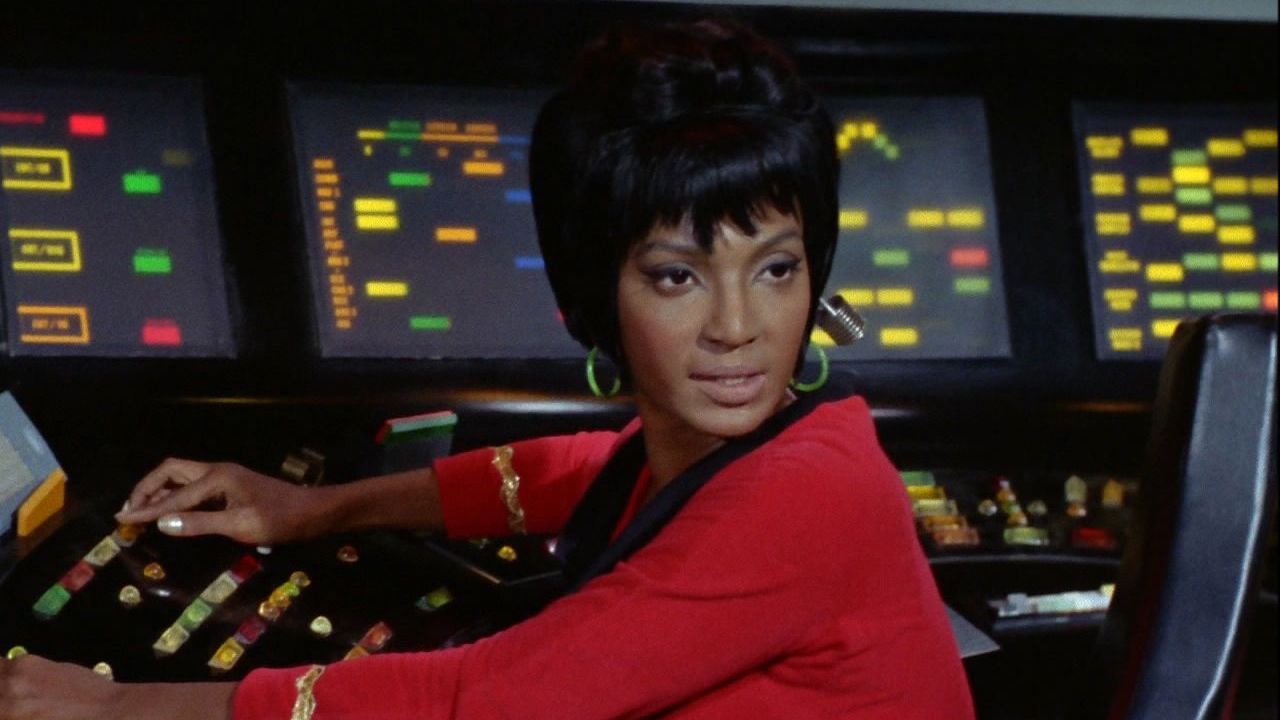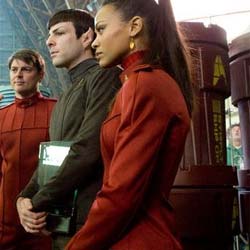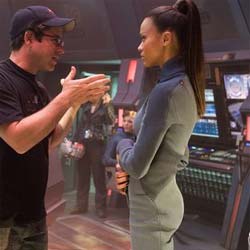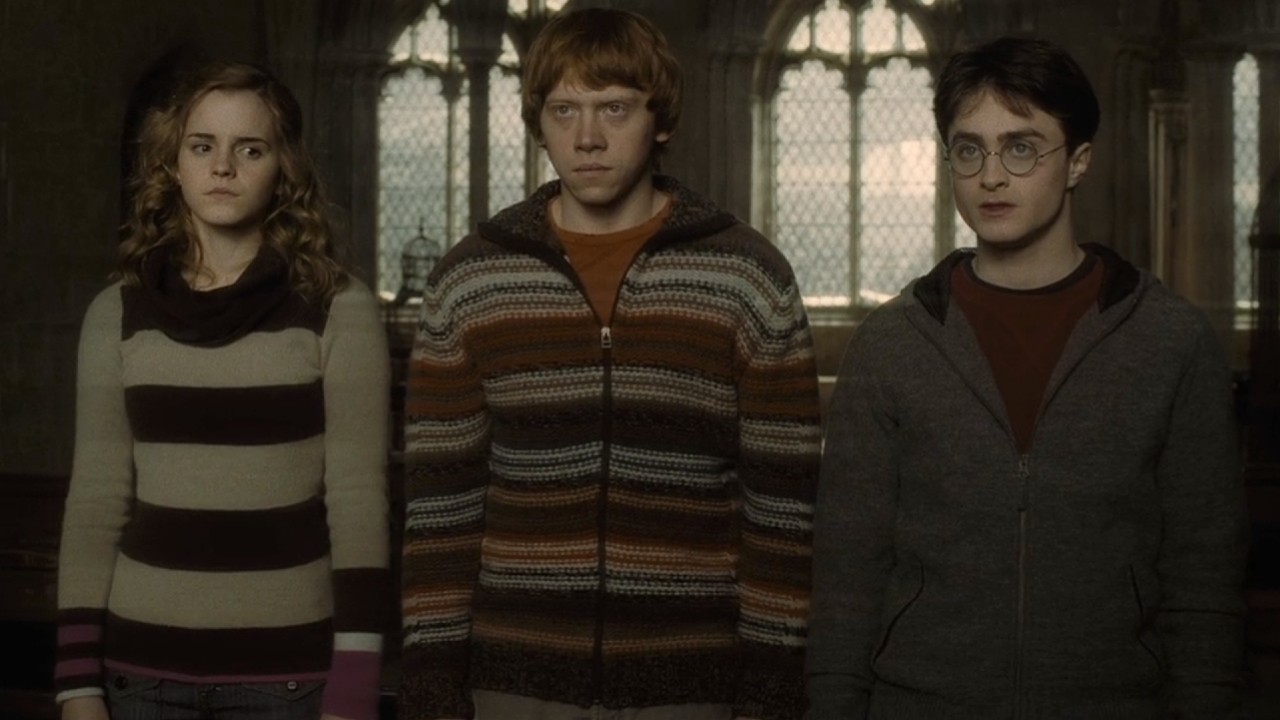Rant: Miniskirts Don't Make Star Trek Sexist

Someone should probably tell the blogsphere that Star Trek debuted last weekend and they can stop flogging it to talk about something else. Since it’s a hot property and people are excited about it, the flogging has continued and continued… and continued until now it’s falling into that ugly, dark place every discussion must go when bloggers get desperate and start running out of reasons to blog. Case in point: Apparently Star Trek now hates women.
As evidence, commentators like Cinematical’s Dawn Taylor point to the film's mostly male cast. There’s only one primary female character present, so of course this must be sexist. I thought we’d settled this a few months ago, when I had the temerity to point out that no thanks, we don’t really need more female superhero characters. Next time I'll shout my incoherent, rabble-rousing ramblings louder.
Consider what Dawn and her supporters are calling for here. This is an established franchise with characters which have been around for decades. They’re suggesting that more women be randomly added to the primary cast in the service of political correctness. And how exactly do we make that happen? After all this is a prequel, a prequel made for the express purpose of telling the origin story of established characters. Where exactly will we get these female characters? Kirk did have a pseudo-secretary on the original series named Yeoman Rand. I guess we could throw her in to the mix, though somehow I doubt adding a gratuitous blonde nookie girl who gets Kirk his coffee would do much to allay their concerns. Maybe if she wears sensible glasses?
Forget for a moment how flatly impossible it would be to add more women to the cast of this particular movie. Yeah the primary players are already locked in, but let’s assume they could’ve somehow figured out a way to shoehorn in a gratuitous Lieutenant Girl. Why should they? I keep coming back to the same problem. Star Trek is and always has been, primarily the interest of men, and particularly geeky men. Forget liking Star Trek, most women aren’t even interested in the men who like Star Trek, let alone the franchise itself. “I’d like to beam you up to my starship baby,” never works as a pickup line, no matter how many times I try it. It’s not just Star Trek, but science fiction in general which has always been the kind of thing guys, not girls are into. We’re all hardwired differently, but part of the appeal in something like Trek is that the men watching identify with characters like Captain Kirk and Mr. Spock. They’re there because we want to be them, we live vicariously through them. Forcing in more strong female characters really does nothing to service that. Much as I love her, I can’t identify with Uhura in the same way I can identify with Kirk, and I never will.

Hold on, I’m not saying women don’t like Star Trek. Many do and if you’re one of them then you’re probably infinitely cool and exactly the kind of person with whom I’d like to hang out. I’ll see you at Comic Con. That doesn’t make you the majority. Exceptions don’t disprove the rule. Don’t talk yourselves into believing otherwise. I love a good rom-com but I also realize that when it comes to guys, I’m in the minority. As it is with superheroes, most of the people obsessing over Star Trek are men. They just are. Hollywood plays the percentages. They know this, so they make science fiction movies for men. Neo had to be a man, because men can’t identify with a female Neo and wouldn’t show up to see it. On the other hand women aren’t likely to turn out in numbers significant enough to carry a post-apocalyptic science fiction film, female Neo or not, on their own. Conversely, Twilight doesn’t work with a man as the main character. Guys aren’t going to see it no matter who’s in it and women won’t identify with a male Bella. I guess you’d have to call him Billy.
I’ve said it before and I’ll say it again: Men and women often have different interests. They see different movies. They read different things. They do so not because they’re forced to or because one sex is in some way inherently superior to the other, but because they are simply different and it’s that difference which makes the whole thing so goddamn perfect in the first place. Sometimes our interests overlap, but we aren’t interchangeable. We’re different and that’s not bad, it’s just different.
Star Trek is and always will speak primarily to men and so it’s going to have a lot of male characters in it. That's not sexism, it's good storytelling. Of course that doesn’t excuse it from treating the female characters it does have as equals. I’ll admit, the original Trek series from the sixties was marginally sexist. Ironically the series’ pilot, “The Cage”, was probably far less so since it featured a female first officer and dressed most of the women within it in the same boring pants and sweater outfits as its male characters. Unfortunately “The Cage” wasn’t picked up, Gene Roddenberry retooled the show by relegating the ship’s women to sidebars and dressing them in hot outfits, leaving only Uhura as a primary castmember. Yet even then, Star Trek was far less sexist than everything else on television in that era. It existed in a time when most women were still homemakers taught to be ashamed enough of their bodies, hidden in kitchens underneath dowdy outfits slaving over hot ovens while their husbands brought home the bacon and spent their evenings bowling with their buddies. Yet on television, Star Trek featured confident women, comfortable with themselves, serving in space as part of a military organization and for the most part, treated as equals… equals who really wanted to sleep with the William Shatner. Hey it’s Shatner! Much like Willy Nelson and pot, I’m almost certain he gets some sort of sexism exception.
Your Daily Blend of Entertainment News

Bottom line: the original Star Trek was a product of its time, with all the societal imperatives that implies. Abrams’ movie is a prequel to a sixties television show, so he’s forced to adopt at least some of those sixties conceits. That means the occasional miniskirt and a lot of men. Yet Abrams does his best to do more with what he has. Uhura’s role is much expanded in the new film. As played by Zoe Saldana, she’s more than just a leggy decoration stuck reading messages back to the Captain. She’s a brilliant, confident student and Spock’s real support system when everything goes to hell. Dawn dismisses her as “nothing more than The Girl, to be ogled in her miniskirt -- and, at one point, in her underwear -- and lusted after by both Kirk and Spock.” Lusted after yes, but she never makes herself subservient to them. She stands up for herself when Spock gives her an inferior assignment and holds her own against Kirk when he tries to throw himself at her. When Spock’s psyche is on the verge of crumbling, Uhura goes to him. Not to gratuitously throw herself on the altar of his lust, but to shoulder his burden and keep him going through the loss of almost everyone he’s ever known.
Besides, what’s wrong with lusting? Since when does equality mean disinterest? It seems the modern definition of a strong woman is now that of a puritanical robot. It’s ok for Kirk to flex his muscles and occasionally rip off his shirt, but it’s unacceptable for us to see Uhura wearing something that shows off her knees. Forget that the film goes out of its way to portray her as by far the smartest and most stable officer on the Enterprise, Uhura in her underwear somehow negates all of that. Women feel free to write creepy, erotic fan fiction based on imaginary romantic relationships between Kirk and Spock (seriously it’s out there), but if Uhura looks hot then its time to cry sexism.
Granted this new Trek isn’t the groundbreaking, establishment challenging drama Gene Roddenberry made out of the first one, and I’m as saddened by that as anyone. This Star Trek has sacrificed idealism on the altar of high-octane adventure. It’s fun and it’s exciting, but it’s no longer thought provoking. At least not yet. To the Dawn Taylors of the world: Give Star Trek a little more credit and then give this franchise a chance. This is only the beginning, a beginning beholden to what came before it. From now on, it’s wide open. For the sequel, Star Trek is free to ditch the sixties and go where no man (As in a human regardless of sex or age, as everyone from Gene Roddenberry to Neil Armstrong has always meant it. Grab a dictionary before you get all PC.) has gone before. Who knows what’s next? Maybe they’ll bring Kirstie Alley back as the Federation’s first chocoholic Vulcan. Personally, I’m holding out for the galaxy’s first gay Klingon.

